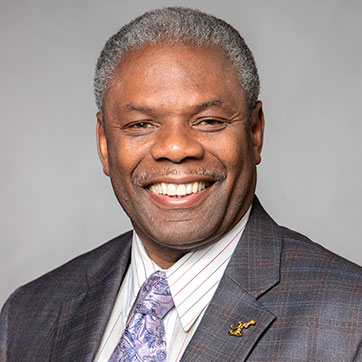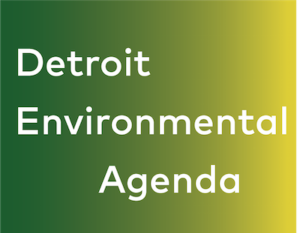Roy McCalister, Jr.

Q: Where can people go to learn more about your biography? If not readily available online, please describe in 150 words or less, your relevant experience, public offices held (if any), involvement in environmental causes, and membership in any environmental organizations. If you currently hold office, describe any votes or actions demonstrating concern for the environment.
A: Current incumbent Councilmember, District 2; Lifetime Detroit Resident; Master of Human Relations Degree; Church Deacon, Cedar Christian Church; Former Investigator, Federal Defenders Office, Eastern District of Michigan; Retired U.S. Army & Army Reserves, Former Regional Cmdr., 5 Northern Provinces of Iraq; Retired Detroit Police, Former Cmdr. Detroit Homicide Section.
Community
Q: If elected, how will you work with Detroit residents to ensure that they benefit from and partake in the decision-making surrounding local development projects and that potential adverse impacts of those projects are identified, measured, monitored and mitigated? Moreover, how would you work to put more power into the hands of residents to maintain and revitalize their own communities and to access vacant land through the DLBA?
A: As the incumbent for City Council District 2, during my tenure, I have held 5 meetings per month by creating Community/Presidents, Business, Millennial and Mental Health Roundtable discussions, inclusive with attending block club, community, association and business meetings. I have appointed community members within my District to be a part of City-wide Commissions and Boards, for their involvement and provide information to the District and their communities. I have a community district office Mon-Fri., with staff 9 AM -5 PM for constituents to have their issues, concerns and questions addressed directly. I have built relationships with DLBA staff and administration to address issues of parcels and vacant dwellings. I work towards continue development and opportunities within District 2. I believe with direct involvement and engagement with my District/Communities, my constituents will continue to receive benefits concerning their needs and quality of life.
Q: If elected, what budget appropriations would you propose to increase investment in needed social and environmental services to help improve the quality of life and health of Detroit residents?
A: Fiduciary oversight is one of the major responsibilities for City Council. I continue to work towards seeking supportive funding programs for health and wellness needs; as well as the needs for mental health. Crime and Security are also social issues surrounding our neighborhoods in reference to quality of life necessary for funding support. Whether home repair, improvement assistance within neighborhoods are environmental issues in which I seek funding support. Again, education, opportunity and employment are the measures which assist in areas of poverty and unemployment. Working with our local businesses and incoming investment groups are other avenues I continue seeking funds and building relationships to help support in the quality of life and health for my constituents within District 2.
Public Health
Q: What long term solutions do you see for addressing vehicle speeds and making our streets safer?
A: Education and holding violators responsible. No matter how many law enforcement officers available, or speed cushions placed, if individuals causing the disruption are not held accountable, and/or enlighten to the disrespect to our neighborhoods, then their actions will continue. This is very evident, because their actions are not carried beyond 8 Mile or 5 Points, so it is an accountability to Detroit and our neighborhoods which must be considered. I believe educational through our court system, fines and retraining are the factors to resolve vehicle speeding and making our streets safer.
Q: How will you work to reduce the negative health impacts of air quality on the residents of Detroit?
A: Air quality Standards are being recognized. I address this issue with developers coming into the city of Detroit as a standard.
Q: If elected, what actions will you take to work toward safer, healthier, and more affordable housing for all Detroiters?
A: As the current incumbent, I continue to look at funding sources, whether through Budgetary discussions, working with investors, and our Housing Department to bring about standards to affordable housing in Detroit. Also, working on a reasonable Average Median Income (AMI); another standard which I continue to address, for within this area reasonability to provide not only providing safer, healthier, but affordable housing for Detroiters is also a factor. Also, with American Rescue Plan Act ($826M) coming into Detroit, this will also assist with programs for safer, healthier and affordable housing in Detroit.
Q: What are your priorities to reduce emissions and lessen the impacts of climate change in Detroit during your term in office?
A: During my tenure, I have continued to work towards this issue. With the arrival of Amazon to the State FairGrounds, I’ve been in constant contact with the landowners, and Amazon regarding emission reduction, and will continue to address this issue with developers within District 2, and throughout the City of Detroit. Also, with ARPA ($826M) funds coming to Detroit will also be an assistant factor with emissions and quality of life factors.
Energy
Q: What are your plans for helping the city transition to renewable energy and how will you ensure that the cost benefits and increased resilience that come from the use of renewables is made accessible to low-income and vulnerable communities across Detroit?
A: Renewable Energy is a source and concern for the future. With many cities across the nation seeking measures to address this issue of transition, and Detroit transitioning from a Motor City to Technical Institutional City, I continue to research and review programs for Detroit to be on the forefront towards this transition. I look forward to suggestions in this transition for renewable energy, to the assessment towards low-income and vulnerable communities across Detroit to determine the best process and again with ARPA coming within the City of Detroit work to utilize such funding accessibility for these opportunities.
Recycling
Q: How can the city increase recycling, composting, and the use of post-consumer recycled materials, while addressing the city’s litter and illegal dumping problem?
A: Education of residents is the process which I continue to address during my Roundtable Discussions, having members from recycling groups and associations to provide presentations with this endeavor. The more constituents are educated and participants in this recycling and energy efficient programs, the more the percentage rates will increase. Also, working with the Department of Public Works (DPW), communities and Detroit Police Departments, we have identified continuous dumpers of illegal debris, held such violators accountable through clean-up, fines, and social involvement. Theses are the measures which are necessary to continue.
Jobs
Q: What steps would you take to prepare the local workforce to take advantage of and be part of the movement toward a green economy, through qualifying for good paying infrastructure and clean energy jobs, amongst others?
A: While reviewing Detroit awarded contracts, I continue to determine how many Detroiters are and/or will be employed. Are contractors Detroit-Based. How many Black-owned, Women-owned, minority business owners are receiving such contracts. Working with the Wayne County Trade Alliance, other unions and labor associations to assist with skill, trade and specialist training; with Randolph Technical Trade, and Focus Hope within District 2, I look towards bringing in more skilled, trade, and technical schools into Detroit for more availability in Detroit. Again, ARPA funding coming into Detroit is one of the funding objectives to support this effort. These factors assist towards green economy, good pay, health and benefits infrastructure towards jobs, opportunity to deter poverty, good employment toward good working conditions and quality of life factors.
Water
Q: How will you ensure that clean water is accessible and affordable to all Detroiters?
A: In my tenure, I have continued to work with our Director and Staff of Detroit Water and Sewage Department, State and congressional representatives regarding programs and assistance for clean, affordable water, and to divert water shut-offs for citizens, seniors for assistance.
Q: How will you help municipal agencies and property owners integrate Green Stormwater Infrastructure (GSI) across the city to manage stormwater and reduce drainage charge fees for property owners?
A: I associate this response to the above response, for this includes our residents within the City of Detroit. Especially working with Representatives at our State and Federal Levels for additional resources and funding toward this endeavor.
Optional
Q: Please identify the top environmental concerns to you personally, identify the environmental issue in your community that is the most pressing, and what you would like to do as an elected official to address this most pressing concern.
A: Illegal dumping, and blight are continued issues which I continue to address, which I have responded to in an earlier response, but environmental issues are and should be a continued discussed topic, not only for our currently living standard and status, but also for the future of our communities, the future for the next generations, and a good quality of life for people overall.

